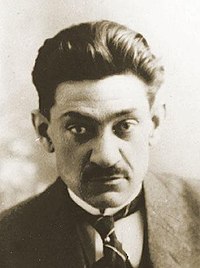fiction.wikisort.org - Writer
Dmytro Ivanovych Dontsov (Ukrainian: Дмитро Іванович Донцов) (August 29, 1883 – March 30, 1973) was a Ukrainian nationalist writer, publisher, journalist and political thinker whose radical ideas, known as integral nationalism, were a major influence on the Organization of Ukrainian Nationalists.[1][2][3]
This article includes a list of references, related reading or external links, but its sources remain unclear because it lacks inline citations. (August 2022) |
Dmytro Dontsov | |
|---|---|
 Dmytro Dontsov | |
| Born | August 29, 1883 Melitopol, Taurida Governorate, Russian Empire |
| Died | March 30, 1973 (aged 89) Montreal, Quebec, Canada |
| Pen name | O.V. |
| Occupation | Ukrainian nationalist writer, publisher, journalist, political thinker, activist, literary critic |
| Language | Ukrainian |
| Nationality | Ukrainian |
| Alma mater | Saint Petersburg University (1907) |
| Literary movement | Integral nationalism |
| Spouse | Maria Bachinsky (1891–1978) |
| Signature | |
 | |
Biography
Dontsov was born in Melitopol, Taurida Governorate (today Zaporizhzhia Oblast) to an old cossack officer's family, and in 1900 moved to Saint Petersburg to study law. In 1905 he joined the Ukrainian Social-Democratic Labor Party (USDRP) and met and befriended Symon Petliura.[4] Dontsov's first published articles were published in the magazine Slovo which was edited by Petliura. Between 1905-1907, Dontsov was arrested twice due to his involvement in socialist politics. Dontsov moved to Lviv in April 1908, where in 1917 he completed his doctorate in law.[4] In 1913, he quit the USDRP due to the conflict based on the national question.
During the time of the Ukrainian War of Independence, Dontsov served in the government of Hetman Pavlo Skoropadsky, where he became the head of the government's official news agency. During that time together with Vyacheslav Lypynsky and Volodymyr Shemet he created the Ukrainian Democratic-Agrarian Party (Khliboroby-Demokraty). With the fall of the Ukrainian State between 1919 and 1922, he lived in Switzerland, where he headed the press bureau of the Ukrainian People's Republic. In 1922-1932, he was the editor-in-chief of the Literaturno-naukovyi vistnyk (Literary Scientific Herald). From 1933 to 1939, Dontsov was publishing and editing Vistnyk.
Ideology
In 1914, Dontsov moved to Lviv. He rejected the Marxist ideology he had previously found appealing.[3]: 400 Dontsov was critical of ideas about pan-slavism, which had gained some popularity. Instead he believed in a hierarchy of "master nations" and "plebian nations".[3]: 403 His theories came to be considered integral nationalistic but authentically Ukrainian. Unlike many Ukrainian politicians of his time, he opposed any ideas of consensus and cooperation with the Russian government. His views grew out the study of historical Ukrainian-Russian relationships, primarily.
During this time, he edited several journals and wrote numerous articles on Ukrainian nationalism. His writings lambasted the failures of Ukrainians to achieve independence in 1917-1921, ridiculed Ukrainian figures from that era, and proposed a new "nationalism of the deed" and a united "national will" in which violence was a necessary instrument to overthrow the old order. He condemned the Polonophilia, Russophilia, and Austrophilia of various segments of contemporary Ukrainian society. In his writings, Dontsov called for the birth of a "new man" with "hot faith and stone heart" (гарячої віри й кам'яного серця) who would not be afraid to mercilessly destroy Ukraine's enemies. He believed in the sacredness of national culture and that it should be protected by any means necessary. His fiery exhortations had a profound influence on many of Ukraine's youth who experienced the oppression of their nation and who were disillusioned with democracy.
Although he did not become a member of the Organization of Ukrainian Nationalists, his writings served as an inspiration for OUN members[3]: 400 and many Ukrainians not only in Galicia but in Volyn as well, where OUN influence had been negligible before 1941 and the local Ukrainian movement had been led by the Communist Party of Western Ukraine and where his writings were sold even more than in Galicia.
Exile
In 1939, on the eve of the Soviet Invasion of Poland, Dontsov left Poland, living in Bucharest, Prague, Germany, Paris and the United States. In 1949, he moved to Montreal where he taught Ukrainian literature at the French-language Université de Montréal. He died in 1973 in Montreal, and is buried in Bound Brook, New Jersey.
References
- Trevor Erlacher (2014). "The birth of Ukrainian "active nationalism": Dmytro Dontsov and heterodox marxism before World war I, 1883–1914". Modern Intellectual History. 11 (3): 519–548. doi:10.1017/S1479244314000171. S2CID 144888682.
- Myroslav Shkandrij (2015). "National democracy, the OUN, and Dontsovism: Three ideological currents in Ukrainian Nationalism of the 1930s—40s and their shared myth-system". Communist and Post-Communist Studies. 48 (2–3): 209–216. doi:10.1016/j.postcomstud.2015.06.002.
- John A. Armstrong (1968). "Collaborationism in World War II: The Integral Nationalist Variant in Eastern Europe". The Journal of Modern History. 40 (3): 396–410.
- Oleh Bahan (29 July 2008). "A romantic in the era of pragmatism". The Day.
External links
- A romantic in the era of pragmatism (in English)
- Longing for the heroic - Dmytro Dontsov: a person of European spirit and Ukrainian mindset article by Dmytro Drozdovskyi (in English)
- Encyclopedia of Ukraine (in English)
- Dmytro Dontsov's life and examples of his work (in Ukrainian)
- Dontsov's view of Leninism (in Ukrainian)
- Belarusian translation of Dontsov's "Nationalism" (in Belarusian)
- Archives of Dmytro Dontsov (Dmytro Dontsov fonds, R6132) are held at Library and Archives Canada (in English)
Другой контент может иметь иную лицензию. Перед использованием материалов сайта WikiSort.org внимательно изучите правила лицензирования конкретных элементов наполнения сайта.
WikiSort.org - проект по пересортировке и дополнению контента Википедии